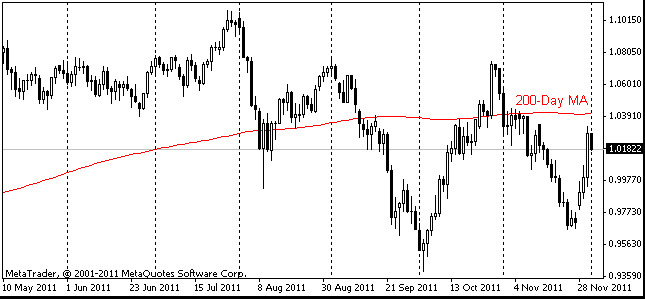EUR/usd
Yesterday we mentioned that the best variant for Europe is the absence of news. However, that situation couldn't last for long. The political uncertainty in Greece again revived market agitation. The Greek Left Coalition leader declared that the bailout terms set by the EU and IMF should be nullified. For now these statements haven't taken the form of laws yet and probably will never take it. But the European leaders will now think twice before issuing of another aid tranche to Greece. The country quite easily managed to disclaim the private debt obligations. That happened with the help of the EU leaders. So now they won't find it easy to withdraw from further performance of their obligations. Most likely, the leaders of the Greek parties don't realize all the political and economic risks of such statements. Besides, there was another unpleasant rumour stirring the markets yesterday. One of the Spanish magazines messaged that the government is going to nationalize the largest banking group in the country, Bankia. To better understand the scale of the problem note that Bankia's assets make 1/3 of all the country's economy and the government a few days earlier announced the plans to issue special debt securities meant to support the suffering regions. Spain is burdened with too many obligations. Will Rajoy bear that heavy load? It's quite natural that under such circumstances the single currency should be under pressure – it again has fallen down to 1.2960. The euro would be much lower if there weren't so many short positions, opened earlier. But the market concerns are observed clearly in other instruments, which are rewriting their months-long lows.

GBP/USD
Despite a certain slackening in the recent few days, the British pound is still rather expensive. It is at the 1.6150 level now, which is 3 points higher than the average annual figure (200-day moving average). This disposition is quite a rare case now as many European risk-sensitive currencies and instruments are now below the similar levels. The pound is regarded by many as the safe-haven asset against the background of crisis in Europe. However, it's not sure that the British economy will be able to resist such an expensive pound, as it's now happening in Switzerland, so we cannot count on this. EUR/GBP is now at the lowest level since November 2008, which adversely tells on the competitiveness of the country's industrial sector.

gold
This morning Gold sank below $1600 and is now trading at $1587, which is the lowest level since the beginning of last January. But the most interesting thing is that the $50 decline over 2 days occurred against the background of risk aversion. It seems that the old seasonal factor is triggering: once March is over Gold starts to grow slower and slower or even stops growing at all. The absence of investor interest may last right up to the end of summer, and the scale at which Gold will decline will depend largely on the market situation and the level of global inflation. Provided risk aversion persists, Gold will have the potential to drop down to 1500 before the end of this month.

AUD/USD
The Australian Finance Minister deserves praise for his straightforwardness when announcing the budget. He confirmed his intention to balance the budget in the coming year and also outlined the policy for the first in the last 30 years cut of government spending. If the situation was more stable, that endevour could be appreciated. But now it looks a bit hasty to take the measures which have sent half of the developed rich countries into the deepest recession. Still the austerity policy requires further softening from the RBA, which was clearly stated by Australia's Finance Minister Swan. In its turn it has adversely affected the aussie. The Australian government and the RBA are working to decrease the attractiveness of Aussie speculations by means of the reduction of the interest rate differential and also keep sticking to the new trend – the budget balance and lower spending. The Aussie is just a point higher than the parity level, so it's very likely that already this week the bears will try to break the parity with the dollar down.
